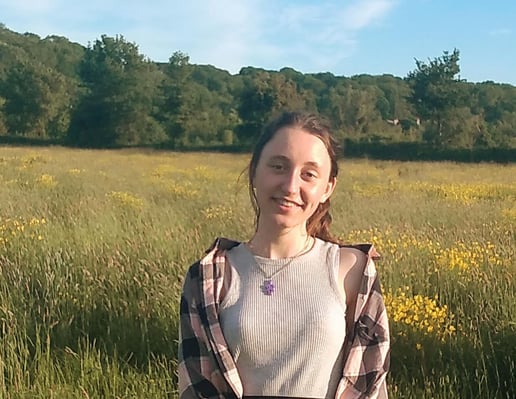It’s easy to think that your experiences are only worth writing about if they are epic or dramatic, the stuff of legends. However, as Eloise Davis’s (UK) potato-themed, first-place winning piece in our Food Writing Competition proves, it’s the seemingly simple and everyday that is often the greatest source of depth and reflection. As Eloise says, her piece “ended up not really being about planting potatoes, but rather the lessons of determination and ideas about a clash of generations.”
Learn all about Eloise’s journey with this piece, why she can never escape humor writing, and which book she recommends!

Out of all the food stories you’re surrounded by, how did you decide to explore this story of your family’s relationship with potatoes?
First, I did my research. Food writing? I thought that meant digging out Granny’s favourite stew recipe, or describing my dream meal. It was really useful to read the example pieces and Andrea Nguyen’s tips. I soon read enough to discover that I couldn’t just describe a really nice chocolate cake, but had to find a food that meant something to me, that could tell a story. Although I was worried that I had nothing unique, that writing about gardening would be something anyone could do, I settled for potatoes because I’ve always loved them, and they’ve always been there for me—like my dad. First and foremost, we are potato people.
Guest Judge Andrea Nguyen praised your piece for “elevat[ing] what could be seen as an arduous and mundane activity—planting potatoes—into an insightful reflection on relationships and connection.” What advice do you have for other writers in making the everyday compelling?
It’s definitely scary to write about something so well-known (nobody wants to write a piece that bores the reader into a fitful agony, and I was terrified that something so simple would have little impact)! I’d suggest concentrating on the layers. Initially, I thought that something as everyday—dull, even—as toiling in mud could not possibly make a good piece of writing. But as I worked on the piece, I unearthed something new. There was a freedom that came from writing about potatoes, which was that there was less need to explain and describe the food. That left me loads of space to explore my changing relationship with my dad, and what potatoes meant for us. That, in turn, allowed me to see potatoes in a whole new light. They became more than just wonky non-vegetables: a symbol of the love that feeds our family. The piece ended up not really being about planting potatoes, but rather the lessons of determination and ideas about a clash of generations, which was why it didn’t feel arduous or mundane.
You’ve described yourself as a humor writer; what was your experience in pivoting to a more reflective form of writing, and did your comedy skills come in handy while writing it?
I can never escape humour writing! It always finds a way to wheedle its way into even the most sombre or sincere of pieces. Sometimes it manifests itself in odd little images, like my six-foot brother “struggling over a can of soup,” or sometimes through mood. This piece, like many, could not evade the comedic clutches, which, for the most part, came through tone. By planning out the journey the story would take first, I managed to reign in any massively distracting anecdotes so as to concentrate on the more serious reflection. However, in the descriptive passages, I found my experience with humour writing let my words flow naturally, freely, which helped the piece feel lighter to read.
What writers/authors have you been taking inspiration from lately?
I’ve just been reading Persepolis, a beautiful autobiography in the form of a graphic novel, by Marjane Satrapi. I was really impressed with how she managed to blend emotional intimacy, education, and hard-hitting moments of devastation with hilarious and relatable highlights. The balance she created was incredible! It pushed me to think about combining reflection and intense connection with a lighter tone, and to test out more nonfiction.





